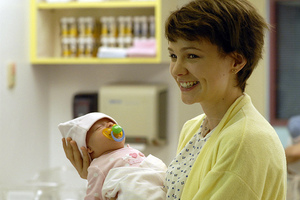Film explores emotion across spectrum
It’s difficult to say whether grief or love is the greatest emotion one can experience. Both are overwhelming, full-body sensations that tend to linger long after the damage is done.

Motherhood · Carey Mulligan, recently nominated for an Oscar for her role in An Education, plays Rose in Shana Feste’s The Greatest. - Photo courtesy of Paladin Pictures
So it’s no surprise, then, how one can replace the other over time.
In The Greatest, a character-driven family drama that premiered at the 2009 Sundance Film Festival, first-time writer-director Shana Feste explores the numerous intricacies and nuances of emotions ranging from distress to apathy, trauma to understanding. A family is broken, a lover is struggling to pick up the pieces and the unrelenting sense of loss hangs like a heavy veil overhead.
Even the film’s prologue, a tastefully steamy scene between young lovers, is shrouded in a sense of bittersweet nostalgia from the first frame. We meet teenagers Bennett (Aaron Johnson) and Rose (Carey Mulligan) as they hurry to undress each other in the fading light of the afternoon. They’re giddy, clumsy and overcome with infatuation.
Afterward, as Bennett drives Rose home, he capriciously halts his car in the middle of a wooded, dimly lit highway. Just as he turns to Rose and says, “I love you,” a truck crashes into the sedan, and it all fades to black.
In the aftermath, we meet Bennett’s family, the Brewers: his obsessive mother Grace (Susan Sarandon), unfaithful father Allen (Pierce Brosnan) and screw-up younger brother, Ryan (Johnny Simmons). What unfolds is, at first, a by-the-numbers tale of grief and familial ties.
But between Grace’s overwrought outbursts, Allen’s steadfast determination to go about his days and Ryan’s drug binges, the Brewers are struck with another, arguably as painful, shock — Rose is pregnant with Bennett’s child.
Without a home or family of her own, Rose approaches the Brewers and, much to Grace’s resentment, is taken in by Allen. It’s a refreshing, if a bit of a deus ex machina twist that allows for fresh relationships and bonds not often seen on-screen to form.
An introspective filmmaker with an eye and ear for realism, Feste exudes a languid 70s-era sensibility often associated with independent auteurs like Robert Altman. She uses the camera as a quiet intruder, moving at a slow and steady pace through the Brewer’s household, catching in minute moments how their lives have been altered and how, more significantly, Rose struggles to desperately piece together the life of her child’s father, whom she barely knew.
Yet when compared to 2008’s Rachel Getting Married, another loosely woven family drama that set no limits on the range of the camera lens, The Greatest seems like a diluted imitation where the camera is barred from the rooms that hold the most secrets.
Although The Greatest failed to garner acclaim and hype at Sundance like several of its highly touted peers, including Precious: Based on the Novel ‘Push’ by Sapphire and An Education, the film’s yearlong wait for its limited theatrical release has swiftly morphed from a frustration to a blessing in disguise.
That blessing? The new wave of success for the film’s centerpiece, Carey Mulligan.
If it were not for Mulligan, the recent Academy Award-nominated 24-year-old who has swiftly become the “It girl” in Hollywood circles, The Greatest would be standard independent fare — and average, at best.
Mulligan’s turn as Rose, however, is truly the anchor of this film, grounding not only audience members to their seats but also the on-screen characters to their oft-forgotten reality. Possessing a certain je ne sais quoi quality to her acting, Mulligan is poised without ever being mechanical. Her facial expressions, inflections and tears are exact, yet reveal themselves rawly, as if she had never experienced those emotions before. She outshines Brosnan, a typically endearing actor, in each scene, and her on-screen appearances opposite the ever-brilliant Sarandon are the most electrifying to watch.
The Greatest also features a surprise supporting performance from Michael Shannon — who plays the truck driver who rammed his tractor-trailer into Bennett’s car — that at once solidifies his 2009 Academy Award nomination for Revolutionary Road and reaffirms his status as one of the finest if underappreciated character actors working today. What stands as more of a testament to Shannon’s talent is that he does it all in a mere five minute scene — a brief but climactic encounter with Sarandon toward the film’s end.
Although the performances — save for Brosnan’s incredibly forced bawling moment — ring true to Feste’s realism, the film’s spotless ending does not. Lives this uncertain and messy do not clean up quickly without so much of a scuff mark left behind; the closure appears more rushed than honest.
This problem hinders many contemporary indie films, especially in an age where most studio-attached independent production houses have folded and distributors are few and far between. A film is much more likely to sell to a distributor (and bring in an audience) if the ending delivers closure or satisfaction to the viewers. As a result, independent films have started to lose their street cred by tying their third acts into neat, little bows instead of letting their endings unravel, leaving them torn and frayed.
Yet happy endings do not necessarily equal closure, and the audience is left more cheated than pleasant at The Greatest’s end credits.
Feste’s bold, defining voice makes her directorial debut a poignant, heartrending drama — but it’s not the greatest.
